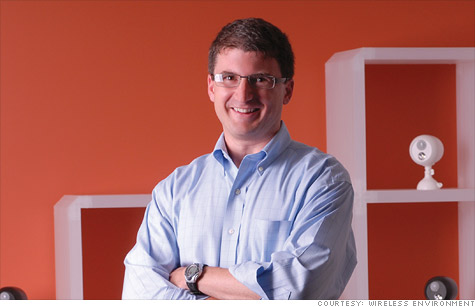Search News

As startups, such as Wireless Environment, struggle to get small business loans, private lenders, spotting an opportunity, are stepping in to fill the gap.
NEW YORK (CNNMoney) -- Small businesses struggling to get loans from banks now have a new source for funding.
Capital Business Credit, a private company that already offers financing to manufacturers, wholesalers and distributors, announced a new program to lend money to U.S.-based small and medium-sized businesses.
The $500 million program, which launched last week, will lend to companies that make a variety of goods, such as food products, paper goods, clothing, home furnishings, electrical equipment and green technologies.
Individual loans to businesses will range from $1 million to $20 million.
"Businesses want to hire, buy new equipment and ultimately expand their companies. But they aren't getting the financial support from banks," said Marc Adelson, CEO of Capital Business Credit.
"This is an opportunity to support businesses that want to buy, build and hire in the United States."
Some industry experts applauded the move, saying this type of initiative coming from private industry is exactly what many small businesses need right now.
"Loans are a big concern for small businesses," said Karen Kerrigan, CEO of the Small Business and Entrepreneurship Council.
"Small businesses are squeezed. Because of the economic environment, banks aren't rushing to lend. In the venture capital community, investors are also holding on to money more tightly," she said.
Given this scenario, Kerrigan said she's encouraged to see other players step up to lend a hand. "This is a promising development. Hopefully other companies take note and step up, too."
Getting money from a bank is definitely a bigger challenge for younger companies, explained Raymond Keating, chief economist with the SBE Council.
"Businesses that have been around for a while, that have a proven track record and a long-standing relationship with a bank probably have no trouble getting access to credit," Keating said.
A recent survey from National Federation of Independent Businesses seems to support that point.
The NFIB survey of its 350,000 members, predominantly well-established family-run businesses, showed that 85% of them said they're able to get bank loans.
"Our members said they have no problem getting financing. They just don't want it right now because of the economy and weak consumer demand," said Jack Mozloom, spokesman for the NFIB.
"The NFIB is right in their understanding of the members," said Keating. "Those companies aren't affected. It's the younger businesses that don't yet have an established track record that are feeling the chill of a loan freeze."
David Levine, who launched Wireless Environment in 2006, has been feeling that chill for a while now and it's hurt his business.
"We just launched a new product, the Mr. Beams power outage lighting system. Then Hurricane Irene hit," he said. "There was so much demand for it. Our sales could have been greater, but we couldn't get a line of credit from banks to make more of the product."
Levine said banks are definitely gun-shy of lending to startups. "Banks' definition of a risky loan has changed and that's to the detriment of younger companies."
"Five years ago, a startup could get a loan from a bank using inventory and receivables as collateral. Not now," he said. "If I want a $100,000 loan, I have to first deposit $100,000 with the bank."
Evan Saks, founder of Create-A-Mattress, a two-year-old company that sells mattresses made entirely in the United States, is feeling the pain, too.
"One of the loudest complaints from people that I speak to in and out of my industry is about availability of credit. Then it's economic growth," said Saks.
Saks said his sales are growing since he started the company but the raw dollar number isn't yet where he wants it to be.
"Growth's taking a little bit longer. I had expected more of a recovery by now," he said. "I know if I go to a bank for a loan I'd be discouraged."
SBE Council's Keating said it's a mistake to dry up lending to startups. "These are the companies that will create jobs by innovating and coming up with the next great idea," he said.
"I can't overstate how important this is. Normally in a recession, when you lose jobs you see a pick up in new business creation," Keating said. "This time it's been very slow. You don't want lending woes to become the death of American entrepreneurship."
Levine and Saks said they'd be very interested in approaching other options for loans, such as the new CBC program.
But both wonder whether it will cost them more to borrow from private lenders versus banks.
CBC's Adelson said the small business loans will cost businesses "incrementally more" than bank loans.
If banks are giving small and medium-sized businesses loans at the prime rate plus an additional 2% or 3%, CBC will lend at rates 1% to 3% higher than banks.
"These are companies they aren't able to get loans right now," he said. "So there is risk there."
"We want to support these startups. If we give them a loan and their business stabilizes and grows, it'll cost them less to borrow again from us," he said. "Once they are ready, we'll help these companies get to a place where they can go back to banks for loans." ![]()